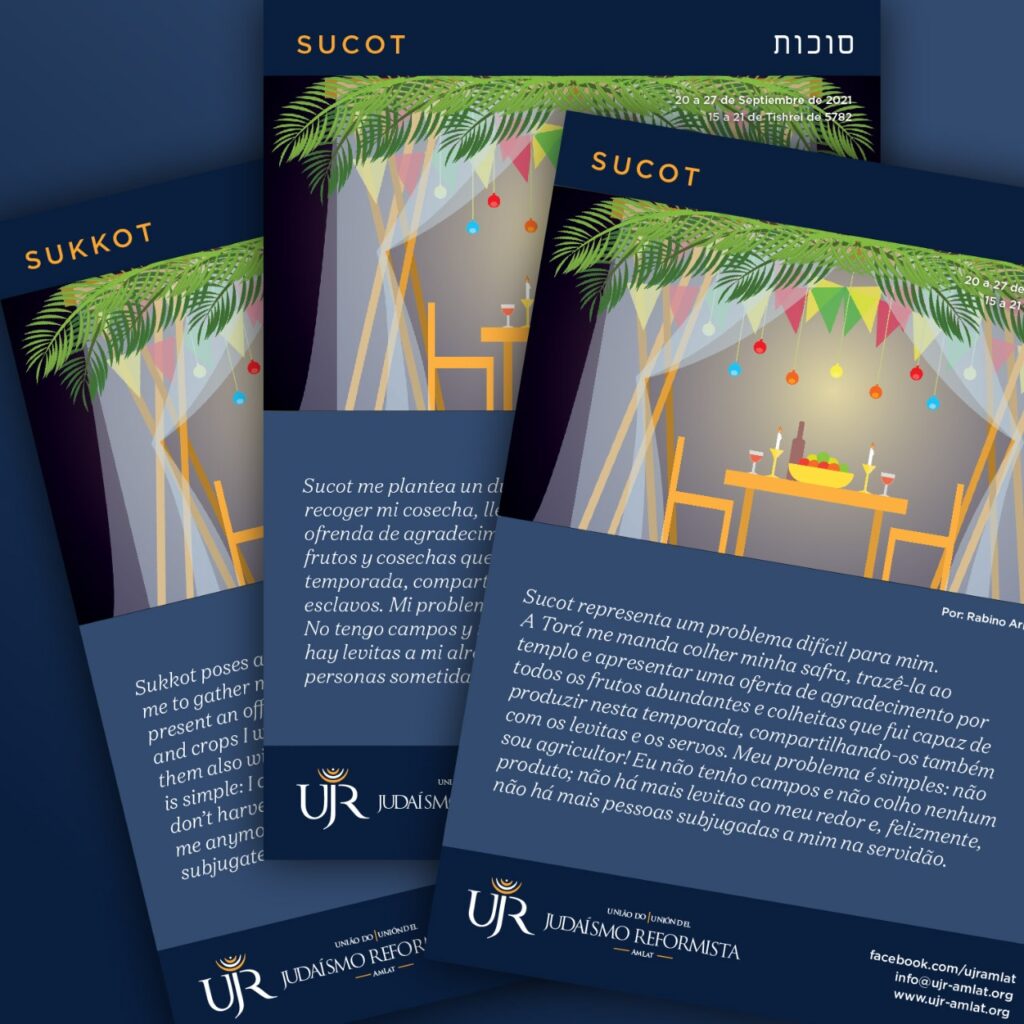Sukkot poses a hard problem for me. Torah commands me to gather my harvest, to bring it to the temple and present an offering of thanks for all the abundant fruits and crops I was able to produce this season, sharing them also with the Levites and the servants. My problem is simple: I am not a farmer! I don’t have fields, and I don’t harvest any produce; there are no Levites around me anymore, and fortunately there are no more people subjugated to me in servitude.
How can I celebrate the festival as Torah commands?
I have two bad options: one, is to say “Oh, well… things have changed, and this is no longer something that applies to me”; the other, is to pretend nothing has changed, and somehow go through the motions, buy fruits in the supermarket to then use them to express my thanks inside the Sukkah in which I never harvested anything at all.
Two bad options; but fortunately I have a third.
Instead of looking at the details and material elements of the old harvest festival as celebrated 2700 years ago – I can focus on the essence and the purpose of the celebration. Surely, Torah doesn’t care about olives and dates, nor sees any fruit or tree as holy or sacred. What Torah really cares about is our communal and personal lives, being lived with ethical and moral values.
Sukkot is the perfect example of that: Torah does not command us to harvest the fields – we harvest the fields because we are farmers, and that’s the reality in which we live. What Torah commands is that – as we do our regular work and economic activity – we take a moment to pause, make a time to stop the production and the work, and make a celebration. In Sukkot, a farmer celebrates the fruits of their fields (whether they are small or large); but a student celebrates the fruit of their studies; a business owner celebrates the success of their business. We all can, and should, take a time to celebrate the fruits of our efforts, big and small. We all can take the time to express gratitude for what we “harvested” this season, in our work, in our business, in our personal growth, in our careers, in our journey through life.
Sukkot is not only a personal moment to display and develop the good character traits of gratitude and humility. It also has a social dimension: we are commanded specifically to make this a moment of joy for others, for our extended families, for the foreigners who live among us, for those who don’t have abundance to celebrate. Sukot is not about “me”, but about “us”. So, rather than looking for “Levites, maidservants, and foreign Cannanites” from Ancient Israel to invite them to my Sukkah, I truly follow Torah when I look around my real current society, and find in my city and my neighborhood those for whom this season has not brought abundant fruit – and decide that they are not “them”, but are “us”.
On this Sukkot, in my congregation, we built a Sukkah; we decorated it, we got the four species, and have Shabbat and Sukkot services. But that would not be enough; that would be plainly short of what Torah commands and expects from us. Dwelling in the Sukkah, a precarious and temporary place, is meant to remind us that having a safe and secure home is not to be taken for granted. There are thousands of families in my city who live in “precarious and temporary” houses – who cannot afford a home, cannot pay the rent, who are evicted and become homeless, who are forced to live in the worst part of town. These are the “servants, Levites, and foreigners” Torah was commanding us to include in our festival, caring for them as one of “us”. This Sukkot we will also celebrate on Zoom, gathering hundreds of people to learn about the precarious housing realities around us, and to commit to a plan of action to make a difference. Back in Ancient Israel, Torah told us to “leave the fruit in the corners of our fields” for the needy. We are advocating for leaving 1 cent for each dollar in our town’s budget to provide housing solutions.
This season we have another group of “foreigners who live among you”: refugees coming from Afghanistan, and other places. This Sukkot we follow Torah preparing and furnishing an apartment for a refugee family resettling in our city. We share from our furniture, from our toys, from our household goods – “our harvest” – to give them a decent start, as they now live here, and are part of “us”.
As we enjoy our rituals and festivals, we continue to focus on putting Torah’s ethical, social, and moral values in action, in our reality today.
Chag Sameach!
—
Rabbi Ariel Edery
Beth Shalom, Cary, USA
—





